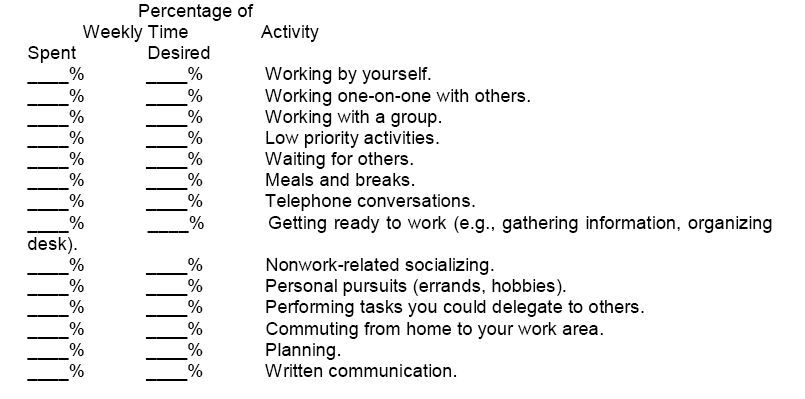Church management/Ministry Time Management
| Modules | Introduction | The Church vs. The Concept of Leadership | Elements of Leadership | Ministry Time Management | Bad Practices in Church Management | Summary |
|---|---|
Contents
MINISTRY TIME MANAGEMENT
The manager’s scarcest resource is usually not information, nor manpower, nor even money—it’s time. We all have exactly the same amount of it each day, but some of us have a great deal more to show for it. The goal of managing time is not to get more of it, but rather to get more out of it.
Volumes of excellent readings about time management have appeared in recent years, offering a valuable array of time-saving techniques and tips. When boiled down, however, most of this material has a common theme: control your priorities. We spend our time according to what is most important to us. The way to effective time management lies with carefully defining our priorities management—the proverbial putting first things first.
The ministry manager’s priorities should revolve around the following foundational question: Who benefits by the way you spend your time? Time management decisions in a Christian setting must be governed by the opportunity to serve others. Time invested in ministry activities that benefit others is time well spent.
This suggests a foundational truth about effective time management: once ministry managers are service-oriented, their time actually belongs to others. Time must not be selfishly hoarded by the manager, but other generously invested in others. Spending our precious time on others is actually a greater sacrifice than spending our money on them. The familiar adage, you have to give up something in order to get something, rings true for time management. One of the most common debilitating mistakes ministry managers make is to create more time for serving others simply by working longer hours. They seek to serve by adding on more and more "floors" to an already towering "skyscraper" of daily activities.
Becoming an over-committed "workaholic" is not the solution to the one problem. Giving up some lower priority time-consuming activities the only effective solution. In short, you must give up something of lesser importance) to get something (of greater importance). Christian who genuinely desired desire to serve others will strive to be under committed rather than over-committed. They will have time on their hands, giving them a receptiveness that invites rather than shuts out others.
Such advice may sound like sheer madness to the busiest of managers who blame "role overload" for their habitual lack of time. Indeed, ministry managers are often extremely busy and pressed for time. But then this becomes a professional lifestyle, a significant reworking of the management is warranted.
Time Management in ACTION
Take 60 minutes and undertake the following activity. Be as realistic as possible
|
Getting more out of your time
|
TIPS FOR EFFECTIVE MINISTRY (Committee) MEETINGS
Ministry or Committee meetings can very often "take the wind" out of committed members if not managed properly. While it is necessary to spend time in the Lord's house, wasting time is sinful and will surely be counter-productive. The following four sub-heading may be helpful.
Getting Started
- If possible, post meeting dates in the Sunday bulletin and newsletter
- Give members a reminder call the day before the meeting
- Send out an early agenda by mail or email, or let ministry team members pick it up at the church in a mailbox designated for the committee
- State when meetings will begin and end, and stick to the schedule
- Meetings should never exceed 90 minutes. Even if members are willing to go longer, stick with this rule to avoid creating a negative affect towards future meetings in the minds of members
- Strive to “annotate” agenda items with brief explanatory notes—stress “why” more than “what.”
- Use email or the church box drop-off system to get member reactions on “controversial” agenda items before the meeting, which enables gives committee members the big picture at the start of the meeting and helps the ministry leader know where to focus the discussion
- Always provide some sort of snack (both healthy and unhealthy is possible) at each meeting
- Schedule 15 minutes of social time at the end of the meeting for those who would like to stay
Tips for dealing with the minutes of team meetings
- Prepare and distribute minutes to members as soon as possible after the meeting
- Write minutes in an informal, conversational style (please see the handout example). Stress what was accomplished at the previous meeting more than what was discussed.
- Write the minutes more for those who weren’t at the meeting than for those who were
- Don’t discuss minutes until the end of the meeting in order to get the meeting off to a non-routine start
- NEVER spend more than 5 minutes discussing “minutes.
Leading the Meeting Fruitfully
- Stick to the purpose of agenda items but don’t feel bound by the letter of the agenda. Don’t get bogged down with any single item on the agenda—schedule another time to discuss thorny issues
- Interject thought-provoking questions:
- "Who would benefit from this?”
- “What do you think would happen if…?"
- “What are the pros and cons of…?"
- "Who would benefit from this?”
- Solicit the thoughts or comments of quieter team members
- Occasionally paraphrase what others say for positive reinforcement and to promote good listening
- When someone offers a challenging or potentially controversial comment, ask other team members to state what they heard this person say. Then ask the one who made the comment if that is what they meant. Ask for people’s feelings about the matter (to help them vent emotion)
- Strive to maintain a continuous balance between facts/information shared by team members and their feelings/opinions. Consciously shift the discussion from one mode to the other as needed
- Don't push for a decision if you think an issue hasn't been discussed enough (especially where conflict/controversy are involved), or when you perceive people haven't been very transparent in their comments. Sometimes it’s best to let people’s thoughts and feelings “simmer” between meetings
- Constantly emphasize how others benefit form the ministry’s work
- Always be alert during meetings for the emergence of conflict and recognize the difference between “hot” and “cool” conflict. Hot conflict is centered in temperamental personality clashes and unresolved interpersonal problems between ministry members. Cool conflict is rooted in different perspectives about what should be done or how it should be done
- Do everything possible before, during, and after each meeting to deliver the “4 IAMs” to ministry members: I am productive, competent, needed, and appreciated in the ministry work I do
Tips For Defusing Conflict In Group Meetings
- Occasionally paraphrase what others say for positive reinforcement and to promote good listening.
- When someone offers a challenging or potentially controversial comment, ask other team members to state what they heard this person say. Then ask the one who made the comment if that is what they meant. Ask for people’s feelings about the matter (to help them vent emotion).
- Strive to maintain a continuous balance between facts/information shared by team members and their feelings/opinions. Consciously shift the discussion from one mode to the other as needed:
- Facts/information → Feelings/opinions → Facts-information → Feelings/opinions, etc.
Module Summary
"Who says money is the only resource you may want to have?", TIME may perhaps be the most valuable resource in your arsenal! In this module, we discussed:
|
| Modules | Introduction | The Church vs. The Concept of Leadership | Elements of Leadership | Ministry Time Management | Bad Practices in Church Management | Summary |
|---|---|

